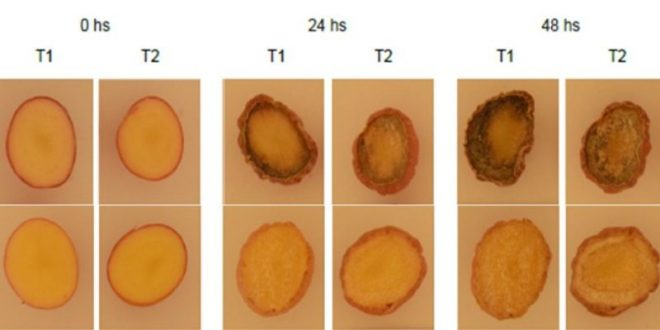#Agriculture #GeneticallyModifiedCrops #CRISPR-Cas9 #SustainableFarming #LatinAmerica #PotatoFarming #Biotechnology #CropImprovement #FoodSecurity #AgriculturalInnovation
In a significant stride for Latin American agriculture, scientists from Argentina’s INTA have made groundbreaking progress in addressing a pervasive challenge faced by farmers worldwide — enzymatic browning in potatoes. This phenomenon, responsible for altering the flavor, texture, and color of potatoes after chopping or peeling, has long plagued the industry, resulting in substantial financial losses for farmers and contributing to food waste.
Using the advanced CRISPR-Cas9 genetic editing method, Dr. Matías González successfully deactivated the gene responsible for the expression of polyphenol oxidase enzymes, the culprits behind enzymatic browning. This breakthrough, showcased in the Desiree variety, allows genetically modified potatoes to resist browning for up to 48 hours, a feat unattainable by conventional potatoes.
The regulatory journey of this edited potato has been notable. It has undergone scrutiny by the Argentine regulatory authority, which deemed it conventional due to the absence of genes from distant organisms. As a result, the potato is expected to bypass the regulatory framework assigned to transgenic crops, marking a milestone in biotechnological advancements for crop improvement.
PhD. Gabriela Massa, a researcher at INTA and CONICET, anticipates the registration of this potato as a new variety, making it available for licensing. This development holds promise for wider adoption in Latin American countries where potatoes are a dietary staple. The potential positive impact on farmers, who often face losses due to browning and bruising, is significant. The technology, if licensed, could offer a lifeline to farmers dealing with pest and disease attacks, reducing economic losses and ensuring a more consistent supply of quality produce.
María Andrea Uscátegui, executive director for Agro-Bio, sees an opportunity for Latin American countries to benefit from this technology. Licensing the genetic modification could empower farmers, particularly those heavily reliant on potato cultivation, by mitigating food loss and improving economic viability. The breakthrough not only addresses the economic challenges faced by farmers but also aligns with the global push for sustainable and efficient agricultural practices.
As Argentina invests in further research on potatoes, including developing types resistant to cold-induced sweetening and enhanced modifications for improved water utilization and drought resistance, the future of genetically altered potatoes in Latin America looks promising. This development signifies a step towards a more sustainable and resilient agricultural future for the region.
The groundbreaking development of genetically altered potatoes in Argentina opens new doors for Latin American agriculture, providing a solution to the persistent issue of enzymatic browning. The potential positive impact on farmers, reduction in food waste, and the broader implications for crop improvement mark a significant milestone. As the technology progresses, it offers a promising avenue for sustainable and resilient agricultural practices in the region.







